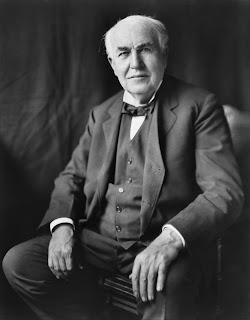Famous Deaf people in the world. #2

On my previous post on, Famous deaf people in the world (#1), I talked about Helen Keller, what made her blind and deaf, how she influenced society and why she's so famous. In this blog, I am going to talk about our next famous person.
Did you know that the incandescent electrical light bulb you are using in your house was invented by a Deaf scientist and inventor?
Did your teacher ever told you that the motion picture camera or the phonograph was invented by a deaf scientist and inventor? Or that the fuel and coal powered electricity to which are using, is being replaced with a solar energy in some places, was an idea from a deaf scientist and inventor 85 years ago before his death in October 18, 1931?
Oh! Maybe the Americans haven't told you that Goldenrod weeds, a natural plant used for producing rubber, was introduced to Henry Ford by a deaf scientist and inventor as a substitute source of rubber for use in automobile tires? Or that the only person who patented 1,093 inventions in America was a deaf scientist and inventor?
This scientist and inventor is none other than Sir. Thomas Edison, a great scientist and inventor in history.
Thomas Alva Edison was born on February 11, 1847 in the port town of Milan, Ohia, U.S, but grew up in port Huron, Michigan.
He was a self-educated, though he was taught at home by his mother at an early age. Much of the education came from reading R.G Parker's school of natural philosophy and the cooper union for the advancement of science and arts.
His father encouraged him to read the great classics and gave him 10-cent reward for each one he finished. Thomas was deeply interested in world history and English literature. He had special fondness for Shakespeare and enjoyed reading and reciting poetry.
When Edison was 14 years old, he contracted scarlet fever (same that affect Helen Keller"). The effect of the fever, as well as a blow to the head by a train conductor, caused him to became completely deaf in his left ear, and 80% deaf on the other ear. However, in later years, he modified the story to say the injury occurred when the conductor, in helping him into a moving train lifted him by the ears.
Thomas Edison learned mose code and the use of telegraph and began a job as a "brass ponder" (telegraph operator). At age 16, Edison produced his first invention, called an "automatic operation." The device transmitter telegraph signals between unmanned stations, allowing almost any one to easily and precisely translate code at his own speed and convenience.
"Thomas Edison was a free-thinker" says Paul Israel, an historian.
Edison was heavily influenced by Thomas Paine's " the age of reasons". In defence of Paine's "scientific deism", Edison said; " he has been called an atheist, but atheist he was not. Paine believe in supreme intelligence, as presenting the idea which other man often express by the name of deities."
On solar energy, Edison said:
Thomas Edison died on October 18, 1931 (aged 84) at West Orange, New Jersey , U.S.
His Quotes:
Many of life's failures are people who did not realize how close they were to success when they gave up.
“Five percent of the people think; ten percent of the people think they think and the other eighty-five percent would rather die than think.
“We often miss opportunity because it's dressed in overalls and looks like work"
“Genius is one percent inspiration, ninety-nine percent perspiration.
"The three great essentials to achieve anything worthwhile are, first, hard work; second, stick-to-itiveness; third, common sense."



Comments